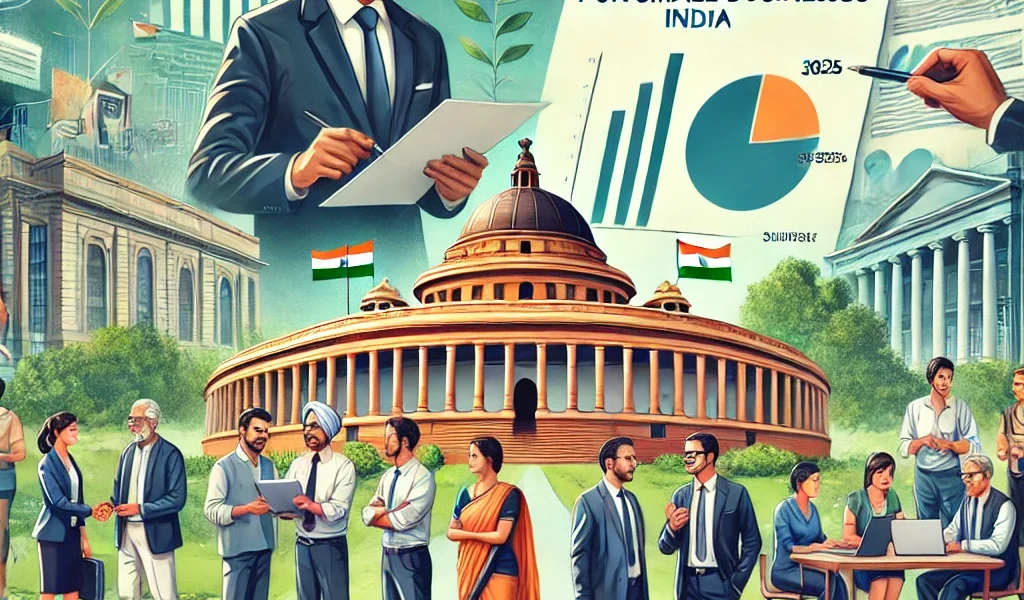Introduction
Small businesses are the backbone of India’s economy, contributing significantly to employment, GDP, and innovation. Recognizing their importance, the government has introduced various subsidies to provide financial assistance, promote growth, and encourage entrepreneurship. In 2025, new and existing subsidies continue to empower startups and MSMEs by reducing financial burdens and offering access to essential resources.
This blog explores the top government subsidies for small businesses in 2025, their benefits, eligibility criteria, and how entrepreneurs can leverage them for success.
What Are Government Subsidies?
Government subsidies are financial assistance programs that help small businesses reduce operational costs, improve competitiveness, and sustain growth. These subsidies come in various forms:
- Direct Financial Grants – Non-repayable funds for specific business activities.
- Tax Incentives – Reductions or exemptions in taxes for MSMEs.
- Interest Rate Subsidies – Lower interest rates on business loans.
- Infrastructure Support – Access to industrial land, technology parks, and incubation centers.
- Export Promotion Subsidies – Assistance for small businesses expanding into global markets.
Top Government Subsidies for Small Businesses in 2025
1. Credit Linked Capital Subsidy Scheme (CLCSS)
The CLCSS provides financial support to MSMEs for technology upgrades and modernization.
- Subsidy: 15% of the project cost, up to ₹15 lakh.
- Eligibility: Registered MSMEs involved in manufacturing.
- Key Benefits:
- Helps in purchasing modern machinery.
- Enhances production efficiency and product quality.
- Reduces dependency on outdated technology.
2. Pradhan Mantri Mudra Yojana (PMMY)
Aimed at micro and small businesses, Mudra Loans provide collateral-free funding.
- Loan Categories:
- Shishu: Up to ₹50,000 (For startups and small traders)
- Kishor: ₹50,000 – ₹5 lakh (For growing businesses)
- Tarun: ₹5 lakh – ₹10 lakh (For well-established small businesses)
- Interest Rate Subsidy: Lower interest rates compared to traditional loans.
- Who Can Apply?
- Small manufacturers, retailers, and service providers.
- Entrepreneurs starting new ventures.
3. Stand-Up India Scheme
This scheme promotes entrepreneurship among women, SC, and ST entrepreneurs by providing loans for business establishment.
- Subsidy: Up to 75% of the project cost (Loan amount: ₹10 lakh – ₹1 crore).
- Key Benefits:
- Encourages diversity in entrepreneurship.
- Provides long-term financial support for sustainable growth.
4. MSME Sustainable (ZED) Certification Scheme
The Zero Defect, Zero Effect (ZED) scheme promotes quality manufacturing and sustainability in MSMEs.
- Subsidy: Financial assistance for obtaining ZED certification.
- Who Can Apply?
- MSMEs aiming to improve product quality and environmental sustainability.
- Benefits:
- Enhances brand credibility.
- Increases access to international markets.
- Supports eco-friendly manufacturing.
5. Technology Upgradation Fund Scheme (TUFS)
This subsidy supports MSMEs in the textile sector by offering financial assistance for technology upgrades.
- Subsidy: Up to 30% capital investment reimbursement.
- Eligibility:
- Small businesses in textile manufacturing.
- Entrepreneurs investing in energy-efficient machinery.
- Advantages:
- Reduces operational costs.
- Improves product quality and market competitiveness.
6. Single Point Registration Scheme (SPRS)
This scheme benefits small businesses supplying goods/services to government departments by offering subsidy benefits.
- Subsidy: Exemption from Earnest Money Deposit (EMD) and Tender Fee.
- Eligibility: MSMEs with at least one year of operations.
- Advantages:
- Increases chances of securing government contracts.
- Enhances credibility and business growth opportunities.
7. Export Promotion Capital Goods (EPCG) Scheme
The EPCG scheme supports small businesses involved in exports by reducing import duties on capital goods.
- Subsidy: Zero import duty on machinery required for production.
- Who Can Apply?
- MSMEs engaged in exporting goods and services.
- Benefits:
- Reduces production costs.
- Enhances global competitiveness.
8. National Small Industries Corporation (NSIC) Subsidy
NSIC offers multiple subsidies, including raw material assistance and marketing support.
- Subsidy: Up to 90 days credit facility for raw material procurement.
- Eligibility:
- Small manufacturers needing raw material financing.
- Benefits:
- Helps in inventory management.
- Reduces working capital stress.
How to Apply for Government Subsidies?
Step 1: Check Eligibility
- Visit official portals like MSME Ministry, Startup India, and SIDBI.
- Review scheme-specific eligibility criteria.
Step 2: Prepare Required Documents
- Business registration certificate
- Aadhar and PAN details
- Financial statements (Balance sheet, tax returns)
- Project report (for loan-based subsidies)
Step 3: Submit Application Online
- Apply via Udyam Registration Portal, MSME Samadhan, or NSIC portals.
- Keep track of the application status and respond to queries.
Challenges in Availing Government Subsidies
- Lack of Awareness – Many entrepreneurs remain unaware of available subsidies.
- Bureaucratic Delays – Lengthy approval processes can cause delays.
- Documentation Hassles – Extensive paperwork may discourage applicants.
- Competitive Selection – Some subsidies have a limited budget, making them highly competitive.
Best Practices for Securing Subsidies Successfully
- Stay Updated – Regularly check government portals for new subsidy programs.
- Maintain Financial Records – Accurate financial data increases approval chances.
- Work with Business Consultants – Expert guidance can streamline the process.
- Follow Compliance Guidelines – Adhering to regulatory requirements ensures continued benefits.
Conclusion
Government subsidies are an essential tool for small businesses, providing financial relief and fostering growth. As India progresses towards a more business-friendly ecosystem in 2025, these subsidies will play a crucial role in empowering startups and MSMEs.
Entrepreneurs should actively explore and apply for these subsidies to enhance their business potential, drive innovation, and contribute to the country’s economic development.
FAQs
1. Are government subsidies taxable for small businesses?
- Most subsidies are not taxable, but businesses should consult financial advisors for clarity.
2. Can a business apply for multiple subsidies?
- Yes, as long as it meets the eligibility criteria for each subsidy.
3. Where can I find updates on new government subsidies?
- Check MSME Ministry, Startup India, and SIDBI portals for the latest announcements.
By utilizing these subsidies, small businesses in India can scale effectively and achieve long-term sustainability.




